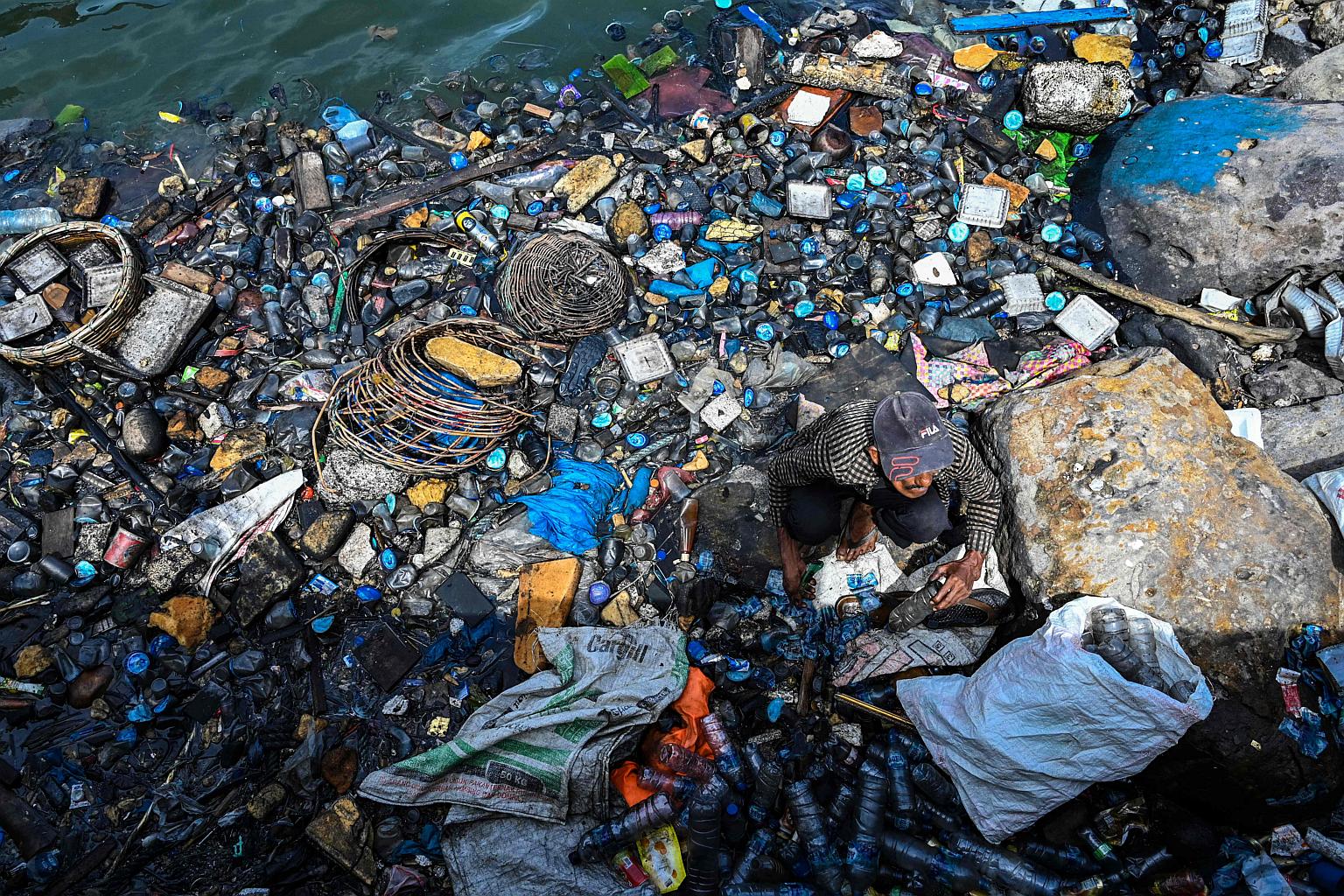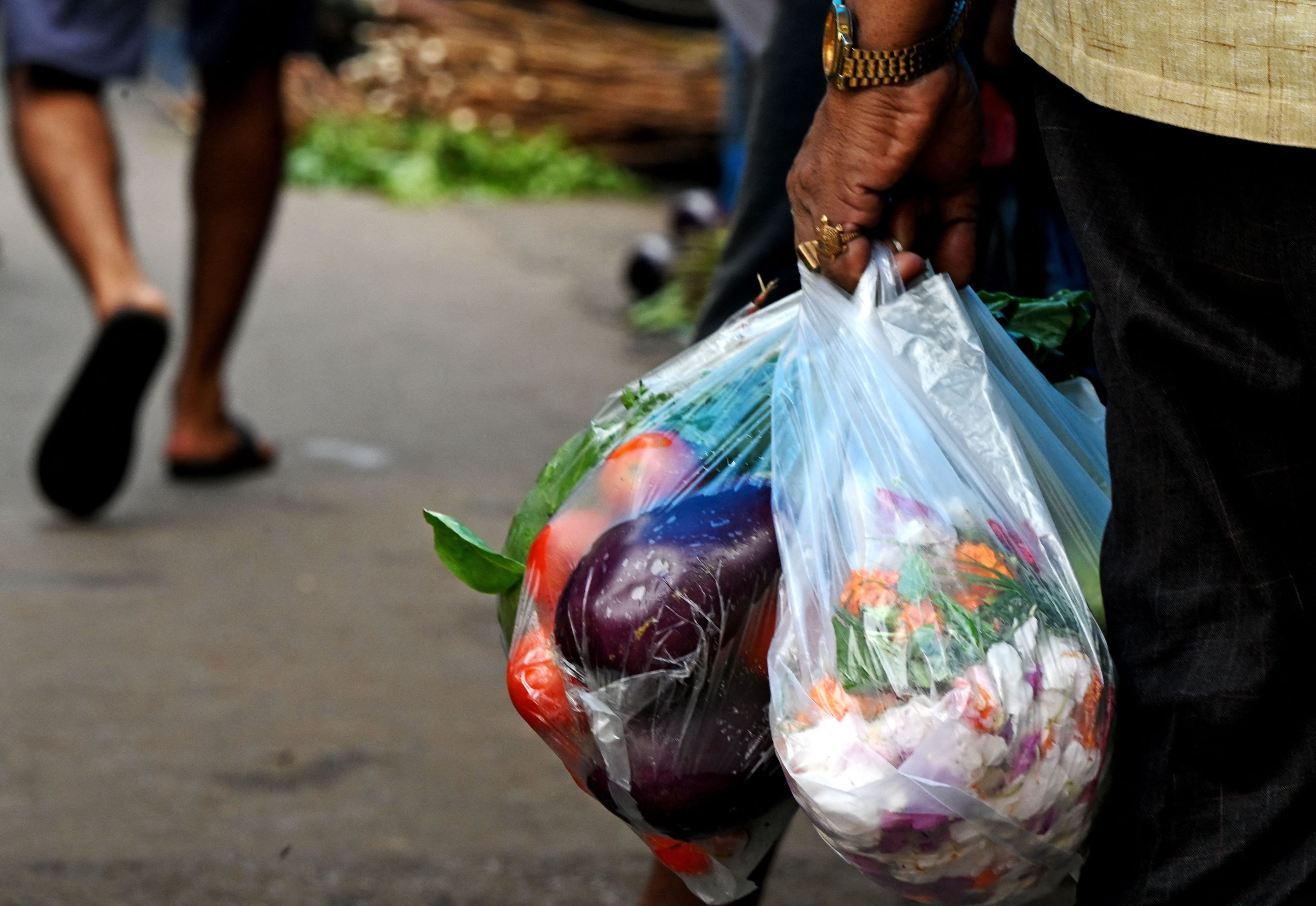To cut plastic waste out of your life, start small
Sign up now: Get ST's newsletters delivered to your inbox

A man collects plastics in the water filled with garbage and oily waste in the Banda Aceh port, on Aug 1, 2022.
PHOTO: AFP
WASHINGTON (BLOOMBERG) - As soon as Ms Carolyn Armstrong started looking for plastic in her life, she realised it was absolutely everywhere. There are the plastic water bottles and straws, of course, but also make-up, clothing, laundry detergent, food wrappers and packaging.
"Everything that we use is encased in plastic," Ms Armstrong says. "Sometimes, I go to the grocery store and take pictures of the fruit that is behind the plastic and I e-mail the store and say: 'Please stop doing that!'"
The 52-year-old author first thought about cutting plastic out of her life while researching a children's book on ocean plastic pollution, and soon joined Go Green Winnetka, a local environmental activism group.
But this year, for the first time, she took her commitment a step further, pledging to go plastic-free for an entire month.
She's far from alone: For more than a decade, people all over the world have been taking a similar pledge, formally known as Plastic Free July.
It's difficult to overstate the scale of the planet's plastic problem. Each year, about 11 million tonnes of plastic waste ends up in bodies of water, according to the United Nations. Over the next two decades, that number is expected to treble. Facing a crisis, the 175 member countries of the UN Environment Assembly in March agreed to develop a treaty for curbing plastic use by the end of 2024.
Companies, not individuals, are the biggest plastic offenders. Specifically, 20 companies, which produce more than half of all single-use plastics, according to a 2021 analysis by the Australian non-profit Minderoo Foundation.
Oil giant ExxonMobil is the world's top plastic polluter. But that hasn't stopped millions of individuals like Ms Armstrong from trying to cut their own plastic footprint - even if only for a month.
"I never set out to start a global movement," says Ms Rebecca Prince-Ruiz, who founded Plastic Free July in her native Australia. "It started the last week of June in 2011, when I visited a recycling facility for the first time… I was really overwhelmed just seeing what we throw away as a society."
The next day at work, Ms Prince-Ruiz told her colleagues she was going to spend a month trying to cut out single-use plastic, and asked if anyone wanted to join. The beginning of July just happened to be coming up, she says. Fast forward 11 years, and several million people across 190 countries have taken part in the campaign, according to research it commissioned.
To reduce plastic use - in July or any month - the best place to start is "just looking at what the plastics are in your life", Ms Prince-Ruiz says. "Have a look in your trash, have a look in your fridge, your pantry, your bin at the workplace. Just choose one or two items to try and tackle, because if you try to do everything it can be really overwhelming."
Fortunately, some of the easiest plastic items to drop are those you use every day. Opting for loose fruits and vegetables rather than pre-packaged produce is one way to ditch some plastic, Ms Armstrong says. There are other ways to limit packaging.
"Our house drinks a lot of orange juice," says Beyond Plastics president Judith Enck. So she switched from the plastic bottles to frozen orange concentrate, and bought two reusable glass pitchers to serve them in.
For those who drink a lot of coffee or tea on the go, Ms Prince-Ruiz says a simple way to cut down on disposable cups is to use a reusable mug or tumbler instead. Many disposable coffee cups are made of paper lined with a plastic called polyethylene. In 2005, roughly 75 million disposable coffee cups were used daily in the United States. That number jumped to more than 105 million cups daily by 2015, according to a Freedonia US Cups and Lids study.
Plastic bags are another easy place to start, says Ms Enck. Of the 4.2 million tonnes of plastic bags, sacks and wraps produced in 2018, only 10 per cent were recycled, according to the US Environmental Protection Agency. Meanwhile, nearly 275,000 plastic grocery bags were found along coastlines globally last year, according to the Ocean Conservancy.

"My shortcut is to pass a law banning plastic bags and you have far more people shifting to reusable bags," Ms Enck says.
Truly tackling global plastic waste will require more than small-scale changes: Corporations and governments need to make fundamental adjustments to how they do business.
But for many people, Ms Prince-Ruiz notes, cutting plastic waste is a gateway behaviour to cutting consumption overall.
"Last year, (Plastic Free July) participants avoided 300 million kilograms of plastic waste," she says. "They also avoided 2.1 million tonnes of overall waste."


